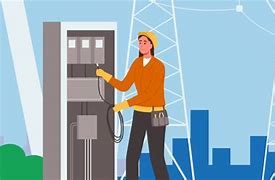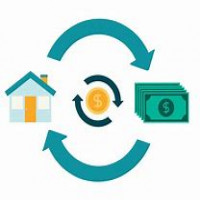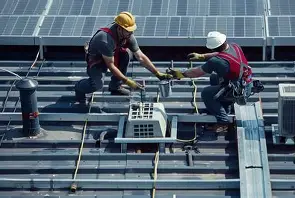Wired for Safety: The Crucial Role of Electricians in Preventing Home Hazards

Electricity is the silent force that powers our lives. From lighting up homes and keeping food cold to running our entertainment and heating systems, we rely on it constantly. Yet, while it's a modern convenience we often take for granted, electricity can also pose significant dangers when not properly installed or maintained. This is where professional electricians step in—not just as installers and repairers, but as the first line of defense against home hazards.
The Hidden Dangers of Electricity
Faulty wiring, outdated systems, and DIY electrical jobs can turn homes into ticking time bombs. Electrical fires, electrocution, and power surges are just a few of the dangers that homeowners might face. According to the National Fire Protection Association (NFPA), electrical distribution or lighting equipment was involved in an estimated average of 32,160 home fires per year in the United States between 2015 and 2019. These fires resulted in hundreds of deaths, thousands of injuries, and over a billion dollars in property damage.
Source: NFPA Report on Home Fires Involving Electrical Failure or Malfunction
These numbers are not just statistics—they represent lives upended, homes destroyed, and countless avoidable tragedies. It's a clear signal that professional electrical work isn't a luxury—it's a necessity.
The Electrician’s Role: More Than Just Wires and Tools
Electricians are highly trained professionals who understand the intricacies of electrical systems. Their job goes beyond installing outlets or fixing circuit breakers. They play a pivotal role in ensuring your home’s electrical system is up to code, safe, and future-proof. Here's a deeper look into how electricians contribute to household safety:
1. Preventing Electrical Fires
Most electrical fires are caused by faulty wiring, overloaded circuits, or outdated electrical panels. Many homes, especially those built before the 1980s, still operate on antiquated systems that can’t handle modern power loads. Electricians assess these systems and recommend upgrades to safer, more efficient wiring, circuit breakers, and safety devices like ground-fault circuit interrupters (GFCIs).
GFCIs, for example, are designed to shut off power within milliseconds if they detect a fault. These are now required in kitchens, bathrooms, garages, and outdoor spaces—but many older homes lack them entirely. An electrician ensures these critical safety features are present and functioning.
2. Spotting Potential Hazards
Electricians are trained to identify signs of wear and tear or damage that the average homeowner might overlook. Whether it’s frayed wires behind walls, rusted service panels, or improperly grounded outlets, a licensed professional can catch problems early—before they lead to disaster.
Regular electrical inspections—especially before purchasing a new home or after a major renovation—are crucial. They help ensure that all wiring complies with national and local electrical codes and reduce the risk of future hazards.
3. Ensuring Proper Load Distribution
Today’s households are packed with high-demand appliances and electronics, from air conditioners to smart home systems. Without a well-designed electrical panel, these demands can lead to circuit overloads, causing blackouts or fires. Electricians perform load calculations to make sure the system can handle the demands placed on it—and make adjustments as needed.
4. Integrating Modern Safety Features
Modern homes come with advanced electrical needs. From home automation systems to solar panels and electric vehicle (EV) chargers, electricians ensure that installations are not only functional but safe. They make sure that surge protectors are in place, devices are properly wired, and everything is up to code.
DIY Electrical Work: A Risky Proposition
In the age of YouTube tutorials, many homeowners are tempted to try electrical fixes themselves. Changing a light switch may seem straightforward, but without a clear understanding of circuitry and grounding, even simple tasks can turn deadly.
According to the Electrical Safety Foundation International (ESFI), home electrical fires account for approximately 51,000 fires each year, resulting in nearly 500 deaths and over 1,400 injuries.
Source: ESFI Electrical Fire Statistics
These sobering figures are a reminder that cutting corners to save a few dollars can lead to irreversible consequences. Professional electricians have the tools, knowledge, and experience to do the job safely and correctly—something that a video tutorial simply can’t provide.
When Should You Call an Electrician?
Too often, homeowners wait until something breaks to seek help. But proactive electrical safety is far more effective than reactive repairs. Here are some key times when you should call in an electrician:
• Flickering or dimming lights – This could signal a serious wiring issue or overloaded circuit.
• Burning smells – Especially near outlets or electrical panels, this is a red flag that shouldn’t be ignored.
• Warm or discolored outlets – These may indicate dangerous arcing behind the walls.
• Frequent circuit breaker trips – A sign your system may not be handling the current load properly.
• Old wiring – Homes more than 30 years old may have outdated materials like knob-and-tube wiring, which pose fire hazards.
• After flooding or water damage – Water and electricity are a deadly combination. Always have an electrician assess the damage.
Electrical Inspections: Your Safety Checklist
Hiring an electrician for a full home inspection can uncover issues you didn’t know existed. Here’s what a typical inspection should cover:
• Condition of electrical panel and circuit breakers
• Wiring type and condition
• GFCI and AFCI protection
• Proper grounding and bonding
• Outlet and switch function
• Surge protection status
• Exterior and outdoor electrical components
• Smoke and carbon monoxide detector wiring
An inspection not only provides peace of mind but also serves as documentation of a safe electrical system—especially valuable when selling your home.
Electricians and Code Compliance
Electrical codes are updated regularly to reflect new safety standards and technologies. Licensed electricians stay current with these changes and ensure your system complies with the latest regulations. This isn’t just important for safety—it can impact your homeowner’s insurance, resale value, and even the legality of renovations or additions.
In some jurisdictions, unlicensed electrical work can result in fines or a failed inspection. Worse, if an electrical fire occurs due to unlicensed work, your insurance may deny the claim.
The Future of Electrical Safety
As technology evolves, so too do the responsibilities of electricians. The growing adoption of smart home systems, electric vehicles, and renewable energy is increasing the complexity of residential electrical systems. Certified electricians are now being trained not just in safety and code compliance, but also in systems integration, automation, and energy efficiency.
Innovations like smart circuit breakers, real-time energy monitoring, and integrated surge protection are making homes safer and more efficient—but only when installed by qualified professionals.
Conclusion: The Unsung Heroes Behind Your Walls
Electricians are more than service providers—they are safety professionals. Their work ensures that your family can enjoy the comforts of home without fear of the hidden dangers that faulty electrical systems can bring. From preventing fires and electrocutions to ensuring your home is future-ready, electricians play a critical, often underappreciated role in household safety.
While many aspects of home maintenance can be handled independently, electrical work is one area where the stakes are simply too high. The next time you flip a light switch, charge your phone, or run your dishwasher, remember: it’s a licensed electrician who made it safe to do so.
Note: IndiBlogHub features both user-submitted and editorial content. We do not verify third-party contributions. Read our Disclaimer and Privacy Policyfor details.







